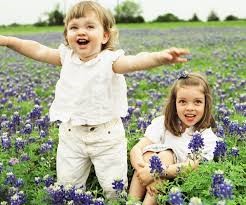The Joy of Being Outdoors
 Being outdoors in a garden or country setting is probably the most enriching sensorial experience anyone can have. Lying on your back in the grass, you look up and see the sky and clouds, you hear the birds and the wind, you smell the plants and air around you, you feel the dampness and silkiness of the grass beneath your body – you can immerse yourself in this total sensorial experience. For young children, who are sensorial learners, this experience is even more intense.
Being outdoors in a garden or country setting is probably the most enriching sensorial experience anyone can have. Lying on your back in the grass, you look up and see the sky and clouds, you hear the birds and the wind, you smell the plants and air around you, you feel the dampness and silkiness of the grass beneath your body – you can immerse yourself in this total sensorial experience. For young children, who are sensorial learners, this experience is even more intense.
Being outdoors puts children in touch with the very roots of their being and they are open and completely welcoming of this experience. The 2-dimensional (sight and sound) experience of being in front of a screen can never compare to the multi-sensorial experience of being outdoors.
To see and touch the living creatures that they find when they lift a rock sparks a child’s curiosity and generates many questions: “What is this?” “What does it eat?” “Where does it live?” Finding out that these creatures inhabit the same world as they do, instills feelings of stewardship for their well-being.
Children need to experience something in order to care about it. These children are going to be the future guardians of our planet. Telling children or showing them a film about the importance of bees for the future of our crops is only an abstract notion for them. But, if we take them out into a garden to watch a bee gathering pollen from one plant, then flying off to
another and subsequently pollinating plants, this is a first-hand experience for the child and will have a much greater impact on their understanding of how nature works in their world.
We should guard against our child being the:
“Last Child in the Woods: Saving Our Children from Nature-deficit Disorder”
by Richard Louv







